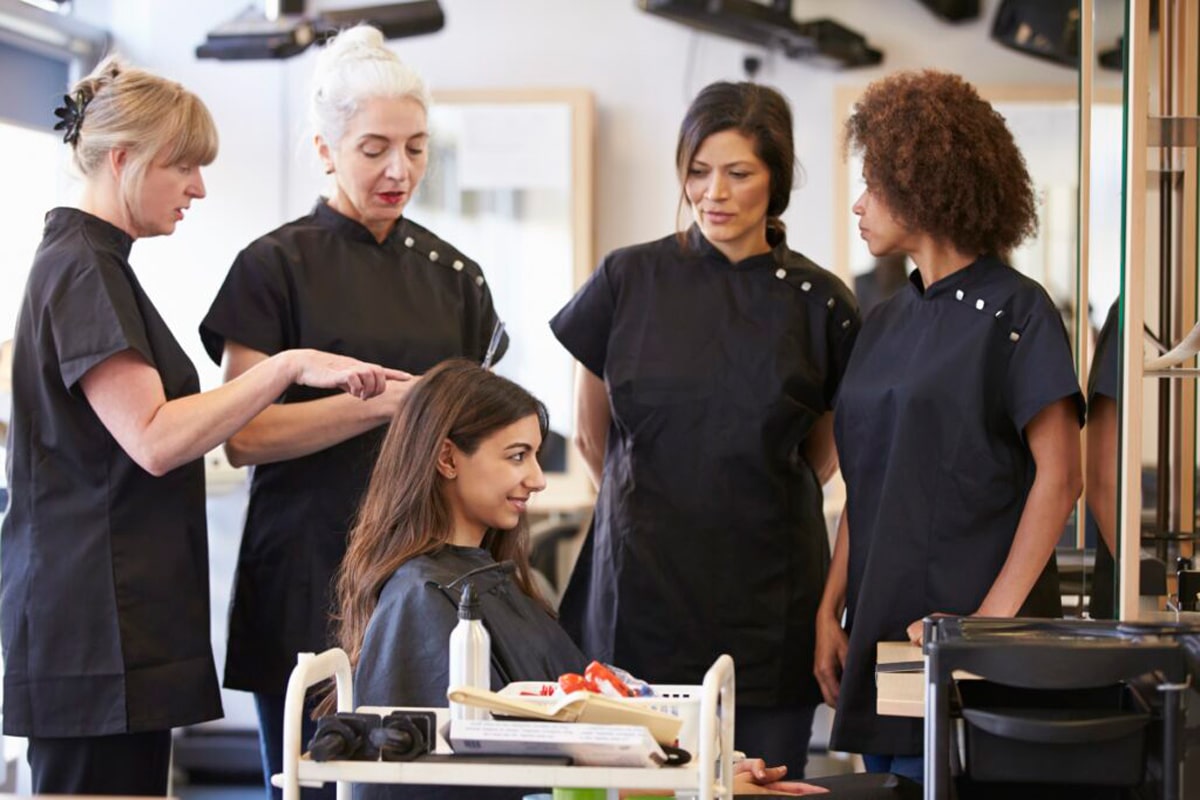
Classroom Policy
Absence & Tardy Policy
1. Theory will start promptly on time. Any student coming in late will not be allowed to enter the classroom until class is completed. If more than fifteen (15) minutes past start time, you are considered LATE and will NOT be allowed to clock in for the rest of the day and must follow the Make-Up Policy defined in this catalog.
2. If you are going to be absent or late, you must contact your instructor as soon as possible. If, for any reason, you know that you will be late or tardy, it is your responsibility to have yourself marked off the appointment book.
| Percentage of scheduled time to total time of the program | Percentage of total tuition due to school |
| .01% to 10% | 10% |
| >10% to 25% | 50% |
| >25% to 50% | 75% |
| >50% | 100% |
3. Under the SAP policy and other policies of this catalog, there are no distinctions between unexcused or excused absences. Both types of absences count towards the student’s attendance percentage in the same manner, and it is up to the student to monitor. Any student falling below the 70% attendance rate will be subject to probation and eventual termination. Other options, like schedule changes or withdrawal requests, are available for each student should personal circumstances require accommodations.
4. If a student misses more than 14 days and does not return to the school on the 15th day, the student will be subject to termination with the dropped date as the last date attended.
Code of Ethics
1. Principle objective is to train qualified individuals to render the best possible service to patrons.
2. Strives continuously to improve its operation in order to keep abreast with the ever-changing developments and new techniques in the cosmetology industry.
3. Observes all rules and regulations issued by the State Board of Cosmetology and the Health Department.
4. Encourages its instructors to keep current with the latest teaching methods by reading educational books, attending teacher refresher or advanced courses, workshops, trade schools, etc.
5. Makes use of acceptable teaching techniques and training aids (such as textbooks, workshops, films, filmstrips, and other audio-visual aids) in order to advance and provide the best possible training for our students.
6. Takes part in educational conferences and regional meetings in order to advance the profession of the cosmetology industry.
7. Purchases only high-grade equipment, cosmetics, and supplies to be used in the instruction and training of its students.
8. Maintains honest and fair relationships with its staff, students, patrons, the State Board, and other schools.
9. Advertises truthfully and makes honest representations to its students.
10. Refrains from any advertisements or criticism, which might reflect unfavorably on other schools or the cosmetology profession.
11. Develops a strong network with successful salons to ensure greater opportunities for students in the search of a career.
Conduct and General Rules and Regulations
The following rules and regulations must be observed and obeyed in order for our school to operate in a professional and efficient manner:
1. Each student must have their own proper and sufficient equipment. No borrowing is allowed.
2. Any person found stealing will be dismissed from school immediately.
3. Kits are subject to inspection at any time. Non-professional equipment will be removed.
4. It is the responsibility of the student to keep their equipment and workstations clean, sanitized, and/or sterilized. The school furnishes most necessary supplies to keep areas clean.
5. It is illegal to perform services in unapproved locations and illegal to receive pay for services in these locations. The Georgia State Board of Cosmetology imposes a fine and/or revocation of your license if caught.
6. Students are not allowed to clock or sign anyone in or out other than themselves. Students violating this policy may be subject to immediate dismissal from school.
7. Students are not permitted in the Administration Office or the Instructors Office without permission. Students are permitted behind the reception desk and dispensary areas only while assigned to work these stations.
8. Gossip, dirty jokes, profane language, and dissension are not permitted.
9. Smoking, eating, drinking, or chewing gum will not be permitted on the clinic floor.
10. Absolutely no intoxicating substances will be allowed on the premises. Anyone found to be on behavioral or mind-altering substances will be dismissed immediately.
11. Poor attitudes, moods, illnesses, etc., are to be left at the door when you arrive for school. You are more than welcome to pick them up again at the end of the day.
12. Solicitation is not permitted in the school or on the school grounds.
13. Students are not to discuss their hours obtained, time schedules, or rates of tuition with each other or with customers.
14. Students must work diligently in all aspects of instruction.
15. Any student refusing to service a customer or less than anxious to perform the service will be subject to strong disciplinary action. Refusal may constitute dismissal from the school.
16. Students should not have discussions with each other while servicing a client.
17. Students having the ability to speak in any languages other than English will not be permitted to speak these languages on the clinic floor. Courses are taught in ENGLISH.
18. Students are not permitted to do their own hair. Fellow students need these hours too!
19. Student agrees that the school reserves the right to modify, amend, or supplement the catalog or any other notices furnished to the student. Student agrees to comply with the rules and regulations of the school. Failure to comply with the school rules and regulations may result in termination by the school.
Dress Code (Uniforms)
1. Students must wear black pants (no shorts or miniskirts) with a smock or lab jacket (nail technician & esthetician students). No leggings or jeggings allowed!
2. Students must wear closed-toe shoes at all times.
3. Professional hair and make-up are required.
4. No hats, scarves, or any other head dressing unless it is for religious reasons, which should be addressed with your instructor by the first day of class.
Make-Up Policy
Students must make their own arrangements with their instructor to make up any missed classroom theory, practical lessons, or examinations. Students must complete the same material missed from the original class with the make-up instructor as directed on the make-up form provided. Each program has a built-in single day per week timeframe for any make-up hours (subject to change depending on program instructor availability). Although not commonly utilized, it is also possible for a student to make up missed hours/assignments on school holidays with prior consent of the administrative staff and the instructor.
Students must make their own arrangements with their instructor to make up any missed classroom theory, practical lessons, or examinations. Students must complete the same material missed from the original class with the make-up instructor as directed on the make-up form provided. Each program has a built-in single day per week timeframe for any make-up hours (subject to change depending on program instructor availability). Although not commonly utilized, it is also possible for a student to make up missed hours/assignments on school holidays with prior consent of the administrative staff and the instructor.
Withdrawal Policy
All students who wish to withdraw must notify their instructor and the school administration staff in writing in order to appropriately process the withdrawal. In the event a student withdraws from the school, the school will hold their hours for return for a maximum of thirty-six (36) months. After this period, if the student returns, the student must start the program from the beginning.
Advising/Counseling
All students are encouraged to seek assistance from their instructors or other appropriate staff members concerning their classes, or other problems that affect the student’s attendance at school including, but not limited to, school personnel issues, issues between other students, and personal issues. Academic advisement is also provided by the Records Specialist when a student fails to meet GPA or attendance requirements, or upon student request for an appointment at any point during the student’s program.
Grievance Policy
The school will make every attempt to resolve any complaint or grievance that is not frivolous or without merit. Grievance procedures are discussed in orientation, thereby assuring all students know the steps to follow should they desire to register a grievance at any time with the school, its staff or faculty, or its director. All confidentiality in personnel complaints shall be reserved. The school will react promptly to any student grievances in order to maintain quality, value, and a conflict-free environment within our school. Evidence of final resolution of all grievances will be retained in school files.
1. The grievance must be made in writing and any supporting documentation must be submitted within 60 days of the date the grievance occurred.
2. The grievance will be reviewed by the Director’s Office and a response will be sent in writing to the complainant within 30 days. Interviews may be necessary, depending on the nature of the grievance.
3. If the grievance is of such nature that it cannot be resolved by the Director’s Office, it can be referred to an appropriate regulatory agency if applicable. The complainant must exhaust the internal complaint process before submitting to a regulatory agency, as applicable.
School State Licensing Agency
GA State Board of Cosmetology & Barbers
214 State Capitol
Atlanta, GA 30334
404-656-2881
http://sos.ga.gov/
School Accreditation Agency (currently seeking full accreditation)
Council on Occupational Education
7840 Roswell Road
Building 300, Suite 325
Atlanta, GA 30350
770-396-3898
https://council.org/contact-info/
Equipment
Students are issued equipment and supplies. It is the student’s responsibility to sanitize equipment and make sure it is in good working order. If any equipment is lost or damaged, it is the student’s responsibility to repair damaged items or purchase lost items.
Visitors
Visitors are allowed on a limited basis. Administration must pre-approve all visitors.
Lost and Found
Any items found are to be turned in to the instructor’s office. Students may contact an instructor to inquire about and claim lost property. It is NOT the school’s responsibility if personal items (e.g., clothing, purses, wallets, etc.) are lost or stolen on school premises. We will do what we can within reasonable limits to help the student in recovering such items.
School Holiday Schedule
Dates and Holidays 2024
| Date Range Holiday | Holiday |
| April 1 – April 5, 2024 | Spring Break |
| May 27, 2024 | Memorial Day |
| July 1 – 5, 2024 | Summer Break |
| September 2, 2024 | Labor Day |
| November 25 – 29, 2024 | Fall Break |
| December 23, 2024 – January 4, 2025 | Winter Break |
Dates and Holidays 2025
| Date Range Holiday | Holiday |
| April 7 – April 11, 2025 | Spring Break |
| May 26, 2025 | Memorial Day |
| June 30 – July 4, 2025 | Summer Break |
| September 1, 2025 | Labor Day |
| November 24 – 28, 2025 | Fall Break |
| December 22, 2025 – January 2, 2026 | Winter Break |
Dates and Holidays 2026
| Date Range Holiday | Holiday |
| April 6 – April 10, 2026 | Spring Break |
| May 25, 2026 | Memorial Day |
| July 6 – July 10, 2026 September 7, 2026 |
Summer Break Labor Day |
| November 23 – 27, 2026 | Fall Break |
| November 25 – 29, 2024 | Fall Break |
| December 21, 2025 – January 1, 2026 | Winter Break |
Satisfactory Academic Progress Policy
Satisfactory progress in attendance and academic work is a requirement for all students enrolled in any program and for any category of attendance (part-time/full-time). This policy is provided prior to enrollment to ensure applicants understand all requirements.
1. Maximum Course Completion Time Frame
All courses must be completed within one hundred and twenty percent of the published course length (120% program maximum). Should a student exceed the maximum time frame, they will be allowed to continue in the program, but over-contract fees of $10.00 per hour will continue to accrue beyond the original or amended contract graduation date.
2. Determination of Progress
Students will be evaluated and provided written evaluations of cumulative attendance and academic status when they reach certain actual clock hours as follows:
| Program | Report Hours |
| Master Cosmetologist | 450 900 1200 1500 |
| Nail Technician | 300 600 |
| Esthetician | 450 900 1000 |
| Instructor Training | 375 750 |
| Esthetician Instructor Training | 250 500 |
| Nail Technician Instructor |
125 |
| Master Barber |
450 |
Anticipated 900 hours in academic year for Master Cosmetologist, and Esthetician; Anticipated 250 hours in academic year for Nail Care Instructor; Anticipated 600 hours in academic year for Nail Technician.
The evaluations will show actual hours versus scheduled hours and will be completed within seven (7) days of the student reaching the above hour checkpoints. Students are only required to sign the formal progress evaluations when and if he/she is below the progress standards (academic or attendance). Students must be evaluated at least by the midpoint of the course or the midpoint of the academic year, whichever occurs sooner. In addition, each student must maintain a cumulative 70% rate of attendance.
3. Academic Progress Evaluations
Student Academic Progress (i.e., evaluation on theory, practical, and clinical work; however, clinical work is graded on a pass/fail basis only and will not be considered as part of the overall GPA) will be evaluated during the same time periods as stated above in the “Attendance Progress Evaluations.” Each student is expected to achieve a minimum grade point average of 75%. The grading system is as follows:
100-90%: A (Excellent)
89.9-80%: B (Above Average)
79.9-70%: C (Satisfactory)
69.9-0%: D (Failing)
4. Student Status
Satisfactory Academic Progress: Students who meet the standard for both attendance and academic evaluation periods shall be considered to be making Satisfactory Academic Progress until the next scheduled evaluation. To meet the requirement for satisfactory academic progress, each student must have a cumulative GPA of 75% and maintain a cumulative attendance rate of 70% of scheduled clock hours.
Warning and Probation: Students who fail to meet one or both of the evaluation requirements (Attendance or Academic) shall be placed on warning until the next evaluation period. If a student fails to meet one or both of the evaluation requirements (Attendance or Academic) after the warning period, they will be placed on probation if the student prevails upon appeal of a negative progress determination prior to being placed on probation (see appeal information below). The school may allow for the status of probation if it determines that satisfactory academic progress standards can be met by the end of the subsequent evaluation period. If a student determines this is an inappropriate action based on personal circumstances, they may submit an appeal as stipulated in Item 6 below. A student can re-establish progress status by meeting the minimum attendance and/or academic requirements.
Withdrawals: Academic progress achieved will not be adversely affected by withdrawals. Students re-entering their program will return in the same SAP status as when they left.
RE-ENTRY: If a student would like to re-enroll before ninety (90) days after voluntary withdrawal or termination, they would be subject to previously contracted tuition rates (which will be pro-rated) and other fees. Before a student can be considered for re-entry, all previous balances due to the school must be paid in full and made current based on the percent of the program completed prior to withdrawal or termination. If a student decides to return from a voluntary withdrawal or termination after ninety (90) days, the student will be subject to any new tuition rates enacted by the school since the student withdrew. The student will return in the same satisfactory academic progress status as before withdrawal/termination.
Transfer: Transfer hours from another institution that are accepted toward the student’s educational program are counted as both attempted and completed hours for the purpose of maintaining satisfactory academic progress.
5. Appeal Process
Students may appeal a satisfactory academic progress determination. The appeal must be in writing and directed to the school director, along with any supporting documentation as to why the student failed to meet SAP requirements in the specified period. Submitted documentation must also include a statement signed by the student as to why the student failed to make satisfactory academic progress and what has changed in the student’s situation that will allow the achievement of satisfactory academic progress by meeting the cumulative academic and/or attendance requirements by the next evaluation.
Mitigated Circumstances: If it is determined and documented that a student's failure to demonstrate satisfactory progress was due to personal illness, death of a family member (immediate relation), emotional trauma, etc., the appeal will be accepted and the student will be on probation, if applicable. The institution may allow for probationary status if it is determined that the student will meet SAP requirements by the end of the probationary period. If at the end of the probationary period, the student is still not meeting Satisfactory Progress, the student is allowed to continue the program but is notified that the over-contract fees continue to accrue. The student is no longer eligible for any applicable funding (school not eligible for Title IV), unless the student is on warning or has prevailed upon appeal of the determination that has resulted in the status or probation. A copy of the appeal and determination of the appeal will be placed in the student file.
6. Course Incompletes, Repetitions, Non-Credit Remedial Courses
Course incompletes, repetitions, and non-credit remedial courses do not apply and have no effect on satisfactory academic progress.
Professional Referral List
Drug or alcohol counseling:
| SAPList http://saplist.com/find_a_sap/search.php |
| recovery.org http://www.recovery.org/browse/georgia/ |
| Drug Rehab Services http://www.addicted.org/georgia-long-term-drug-rehab.html |
Emergency Agencies
Georgia State Patrol: (229) 333 5215
Norcross City Police: (770) 448 2111
Gwinnett County Police (West Precinct): (678) 442 6550
Self-Support Agencies
College Drinking Prevention: http://www.collegedrinkingprevention.gov/
Alcoholics Anonymous GA: https://www.aageorgia.org/
Narcotics Anonymous: http://www.na.org/
Higher Education Center for Alcohol, Drug Abuse, and Violence Prevention:
https://www.edc.org/projects/higher_education_center_alcohol_drug_abuse_and_violence_prevention
Mothers Against Drunk Driving (MADD): www.madd.org
Gateway Rehab – www.gatewayrehab.org
Area Medical & Urgent Care Providers
| Comprehensive Primary & Urgent Care 6131 S Norcross Tucker Rd Ste 6 Norcross, GA 30093 |
Northside Hospital 1000 Johnson Ferry Rd NE Atlanta, GA 30342 (404) 381 1732 |
| Trinity Family Urgent/Primary Care 5860 Jimmy Carter Blvd, Ste 125 Norcross, GA 30071 |
Scottish Rite 1001 Johnson Ferry Rd Atlanta, GA 30342 (404) 785 5252 |
| Gwinnett Urgent and Family Care 4775 Jimmy Carter Blvd Ste 201 Norcross, GA 30093 (470) 275 4907 |
Atlanta Medical Center 303 Parkway Dr NW Atlanta, GA 30312 (404) 265 4000 |
Other Blog
-
 Nail Specialist
Nail Specialist
Overview USA Beauty & Barber Academy is a full-service nail...
-
 Nail Instructor
Nail Instructor
Overview Teachers will utilize various instructional techni...
-
 Esthetician Instructor
Esthetician Instructor
Overview Teachers will utilize various instructional techni...
